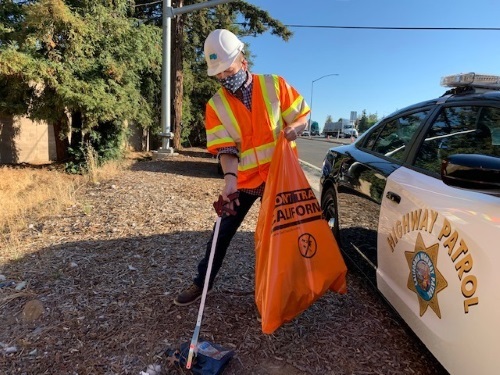The California Department of Transportation and the California Highway Patrol resumed litter removal on state highways as of June 16; cleanup activity that has been limited since March due to the COVID-19 pandemic.
[Above photo by Caltrans.]
“Litter increases the risk of fire, pollutes our waterways, threatens wildlife and costs taxpayers millions of dollars to remove,” explained Toks Omishakin, director of Caltrans, in a statement. “We ask all Californians to be part of the solution, dispose of trash responsibly and secure cargo loads before getting on the road.”
[Omishakin recently appeared in a Transportation TV video touting the benefits of transportation.]
“Not only is littering illegal, but there can be devastating consequences resulting from these senseless actions,” added CHP Commissioner Warren Stanley. “A lit cigarette carelessly tossed from a window can start a brush fire, an unsecured cargo load can result in a collision, and the safety of a highway worker cleaning up the mess is at great risk.”

Caltrans said its maintenance workers and volunteers with the Adopt-A-Highway program will adhere to COVID-19 prevention guidelines developed in consultation with licensed industrial hygienists while clearing highways of trash.
Crews will continue to wear personal protective equipment such as facemasks and gloves and practice physical distancing in accordance with guidelines issued by the Centers for Disease Control and Prevention, the agency added.
Caltrans said it collected 287,000 cubic yards of litter in 2019 alone – enough to fill 18,000 garbage trucks. Of that total, 35 percent resulted from efforts by the department’s community volunteer programs, saving California millions of dollars and untold associated environmental costs.
The agency added that it collaborates with the California Department of Corrections and Rehabilitation and advocacy groups to provide occupational mentoring and temporary employment to parolees and veterans. Participants are trained in litter abatement and the program has grown from eight crews in 2009 to 55 crews operating across the state today.
 States
States
Dina El-Tawansy Appointed Director of Caltrans
July 11, 2025 States
States

